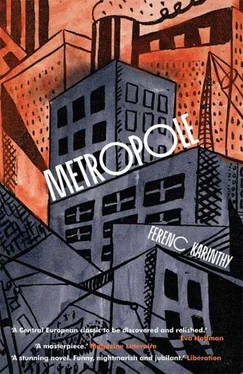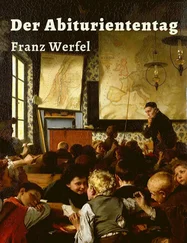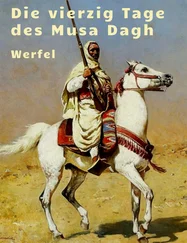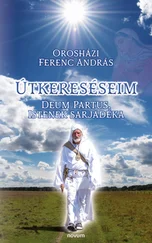Further on, one neighbourhood lay utterly in ruins, all the buildings collapsed and shot to pieces, the street piled high with rubble. One or two fragments were still smoking: there must have been a fierce battle here. A lot of people were clearly moving on, carrying bundles and packets. Families suddenly homeless were pulling carts with bits of salvaged furniture and other miscellaneous possessions. A ragged, long-haired figure stood in the middle of the road, bearded like a prophet, his mad eyes turning this way and that as he flung his arms about and cried the same phrase over and over again like a curse:
‘ Tohoré! Muharé! Tohoré! Muharé! ’
Budai felt sick without quite knowing what was wrong with him. It was partly nausea. There was a nervous feeling in his stomach that he put down to hunger, but even after he had managed to grab a bite — a cheap corn and flour mush he bought at a stand — the nausea persisted.
In the afternoon it started to rain. It was a heavy spring shower. The distant rumbling suddenly grew louder and closer too, ever more frightening. A peculiar restlessness took hold of people: they were running this way and that, keeping close to the walls, sheltering in doorways and abandoned shops, searching for cover as the growl became a threatening roar. Crowds were mumbling and muttering together, some women weeping and screaming in terror. A little further on people were unfurling an enormous black and red flag bearing the symbol of a bird. They stretched it between two windows so it was flat against the wall. Together with a few other pedestrians, Budai took shelter in a china shop on the corner and watched events through the broken window, waiting to see what would happen.
New formations of troops arrived in armoured cars and tanks, on motorcycles, heavily armed detachments. Their uniforms were different from the ones he had seen before: a pale, off-white drill. They wore camouflaged helmets. Two tanks stopped directly in front of the shop and uniformed men stuck their heads out, pointing and shouting to each other — the language they spoke was as strange to Budai as the rest had been.
The upshot of the brief discussion was that they aimed the bigger guns at the large flag and fired. Immediately a cloud of smoke and dust swirled up and most of the wall collapsed. The next shot so shook the building that plates, trays, vases and glasses in the china shop tumbled to the ground and smashed.
Budai ran on, his heart almost giving way. The shower had become a downpour and within a few minutes he was soaked through. He was somewhere he had not been before, a working-class district, he supposed, an estate with enormous, bare tenements, ugly, awkward masses with countless tiny windows, the buildings arranged round a cobbled, oval-shaped open space. Further motorised detachments were rumbling through the streets behind him but even in the rain the open space was full of people. It was only after a while he noticed that the crowd was exclusively female, old and young women, matrons and girls, many with umbrellas. There were at least ten occasions when he thought he saw Bebé among them.
The soldiers arrived and the women surrounded them all talking together, making broad gestures. The soldiers made no answer, staring ahead with stony gazes, their expressions unfathomable as the rain beat on their helmets. Budai couldn’t tell whether they were silent because they spoke a different language and did not understand the women or because they were forbidden to answer. Eventually the women broke into the familiar anthem:
Tchetety top debette
Etek glö tchri fefé
Bügyüti nyemelága
Petyitye!
Having pronounced the last word like a challenge, they cried out bitterly and attacked the white-uniformed men who even now did not react. But the crowd had been changing: ever more men had joined it. They appeared to be doing no more than drifting towards the armed cars out of sheer curiosity but Budai saw that some carried guns under their coats. As their numbers grew, they exchanged significant glances. The women meanwhile were carefully drawing back as if this had all been arranged, part of a strategy.
The whole thing started with the sound of a whistle: suddenly the square went mad with battle cries. Guns suddenly appeared from under coats and opened fire on the tanks. Hand grenades were thrown as well as bottles filled with some explosive, possibly a household liquid. At the same time a mass of other men emerged through the tenement doors and entered the fray, similarly equipped. Over a hundred of them were now swarming around the soldiers. They ran about in strange formations, zigzagging and turning sharply, now this way, now that, only to straighten out and lob their explosives before immediately throwing themselves flat on the ground.
It was far from enough. The soldiers in the armoured cars ducked back down, pulled down their hatches and fired their guns while those on motorbikes let loose volleys of powerful machinegun fire. The ranks of attackers dissolved and pretty soon the open space was covered with the bodies of the wounded. The tanks started up unexpectedly fast and ploughed into the heart of the crowd ruthlessly crushing those who got in the way. They moved like macabre grinders, accompanied by the most desperate screaming and rattling. The cobbles were turning red.
Budai was watching from a little way off, seized by the awful fear of death and, as he ran away, treading over the bodies of the living and the dead, he kept thinking a tank was specifically following him, catching up with him, grinding him under with its metal jaws. His pistol was still in his pocket and he would have been glad to be rid of it but did not want to throw it away in case he attracted attention by doing so. A lot of people were sheltering under a yellow-colonnaded pavilion at the far end of the oval-shaped open space so he joined them.
Everyone was fleeing: crowds were breaking up and scattering chiefly into the surrounding buildings. But even there they refused to give up the fight, firing guns from open windows or from openings in the roof. Now the helmeted soldiers leapt from their vehicles and pursued them up the stairs and soon the battle was raging inside the tenements, gunfire drumming and flashing on ever higher floors and up in the loft. The drama ended with a body falling from on high and landing with a terrifying clatter on the wet cobbles, followed by another and another, some figures waving arms and legs and crying out as they fell, then more and more, one landing on another, blood mingling and running together in the puddles in the rain. It was impossible to watch: Budai gathered all his strength and pushed past people ever deeper into the pavilion. Suddenly he realised that the little yellow structure he took for a pavilion was in fact a metro station or an entrance to it. He managed to dispose of his gun in a litter-bin in the concourse. There were people moving up and down the steps and through the passageways and a great many more waiting and sitting on the platform though there was clearly no service. Only an indifferent voice issuing from the loudspeaker continuously gabbled an endless stream of information. It was close and hot below ground. Steam rose from Budai’s damp clothes. Not having slept for two nights, he found a corner and curled up.
He was woken by the same noise to which he had fallen asleep, the distant, continuous croaking of the personal address system. Down here there was neither night nor day and a great many people were still coming and going, falling asleep or swaying about the corridors and platforms. He stumbled up to ground level but found the gates locked and barred so there was no way in or out and saw that a few white-uniformed soldiers were standing on guard outside with guns at the ready. All he could see through the bars was that it was grey outside — was it dawn or dusk? — and that the oval space, and all the roads leading into it, was completely empty with guards posted on each corner. There must be a curfew, he thought, and went down again to sleep some more.
Читать дальше












